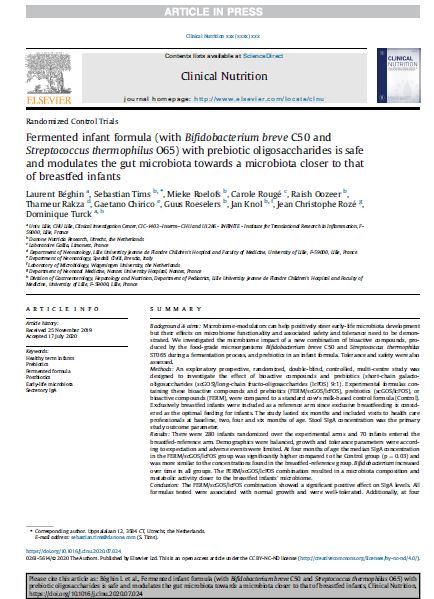The multicentric randomized study of Beghin et al.1 has evaluated the effects of prebiotic oligosaccharides (scGOS/lcFOS*), 3′-GL (3′-galactosyllactose) HMO** and postbiotics combination in infant formulas. Conducted on 350 full-term infants, the study shows that the combination ensures the development of a gut microbiota closer to that of breastfed infants1.
CONTEXT AND METHOD OF THE STUDY
The objective of the study is to assess the effects of infant formulas containing oligosaccharides scGOS/lcFOS* and/or 3′-GL and postbiotics on:
- Infant growth and tolerance
- The composition of the gut microbiota
- Metabolic activity of the gut microbiota
- The immune status of healthy infants
Postbiotics are compounds produced by beneficial bacteria with a biological activity in the host2.
For 6 months, 5 distinct groups are observed:
| Reference Group | Group 1 | Group 2 | Group 3 | Group 4 (control group) |
|---|---|---|---|---|
| n=70 | n=70 | n=70 | n=70 | n=70 |
| Exclusive breast-feeding | Consumption of infant formula containing postbiotics, 3′-GL, and scGOS/lcFOS* (9:1) | Consumption of infant formula containing scGOS/lcFOS* (9:1) | Consumption of infant formula containing postbiotics and 3′-GL | Control group with consumption of a standard infant formula |
Results

In conclusion, this mixture allows a positive modulation of the gut microbiota with a greater proportion of bifidobacteria and fewer adult-like species (Clostridium Difficile) versus the control group.
Thus, the combination of scGOS/lcFOS* (9:1) prebiotics, 3′-GL HMO** and postbiotics allows a composition of the gut microbiota closer to that of breastfed infants1.
To go further
Other studies show that infant milks containing HMO** 3′-GL and postbiotics allow an increase in response to poliovirus-specific intestinal antibodies, fewer severe gastrointestinal infections, and an increase in IgAs*** faecal secretion versus standard infant formulas3-5.
Thus, these other studies demonstrate that infant milks containing HMO** 3′-GL and postbiotics support the immune system function of infants through the gut microbiota3-5.

Download the clinical study of Béghin et al. (2020): Fermented infant formula (with Bifidobacterium breve C50 and Streptococcus thermophilus O65) with prebiotic oligosaccharides is safe and modulates the gut microbiota towards a microbiota closer to that of breastfed infants.
References
*scGOS/lcFOS: short-chain galacto-oligosaccharides and long-chain fructo-oligosaccharides
**HMO: Human Milk Oligosaccharide
***IgA/sIgA: immunoglobulin A / secretory immunoglobulin A
- Béghin, Laurent, et al. “Fermented infant formula (with Bifidobacterium breve C50 and Streptococcus thermophilus O65) with prebiotic oligosaccharides is safe and modulates the gut microbiota towards a microbiota closer to that of breastfed infants.” Clinical Nutrition (2020).
- Patel, Ravi Mangal, and Patricia Wei Denning. “Therapeutic use of prebiotics, probiotics, and postbiotics to prevent necrotizing enterocolitis: what is the current evidence?.” Clinics in perinatology 40.1 (2013): 11-25.
- Mullié, C. et al.Increased Poliovirus-Specific Intestinal Antibody Response Coincides with Promotion of Bifidobacterium longum-infantis and Bifidobacterium breve in Infants: A Randomized, Double-Blind, Placebo-Controlled Trial. Pediatr Res 56, 791–795 (2004)
- Thibault, H., C. Aubert-Jacquin, and O. Goulet. “Effects of long-term consumption of a fermented infant formula (with Bifidobacterium breve c50 and Streptococcus thermophilus 065) on acute diarrhea in healthy infants.” Journal of pediatric gastroenterology and nutrition 39.2 (2004): 147-152.
- Campeotto F, et al. A fermented formula in pre-term infants: clinical tolerance, gut microbiota, down-regulation of faecal calprotectin and up-regulation of faecal secretory IgA. Br J Nutr. 2011;105(12):1843-1851. doi:10.1017/S0007114510005702
BA20-555
